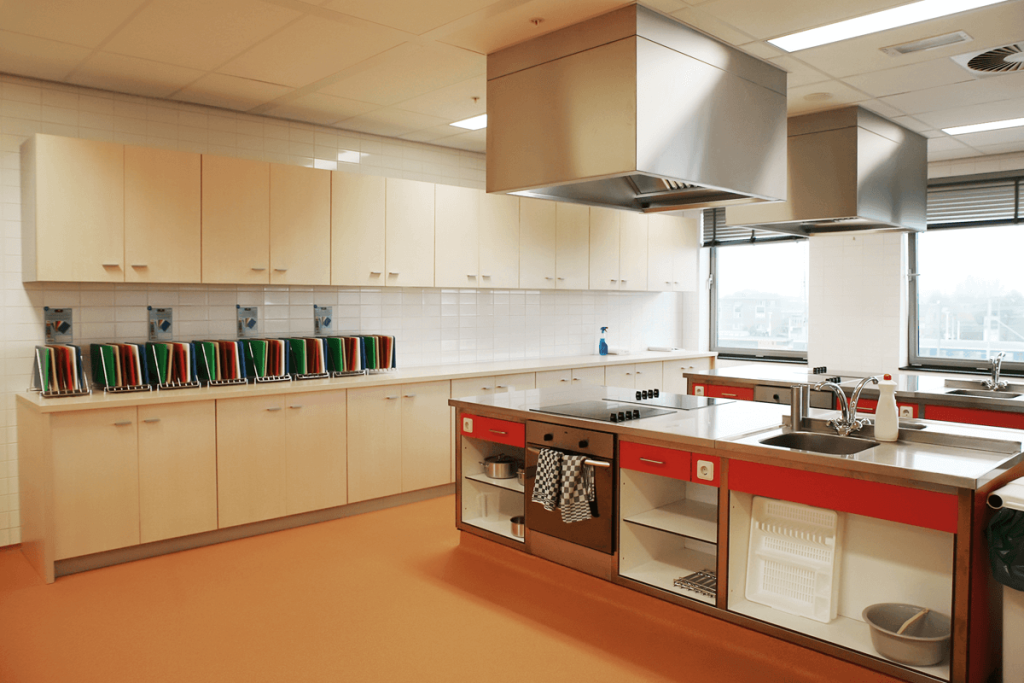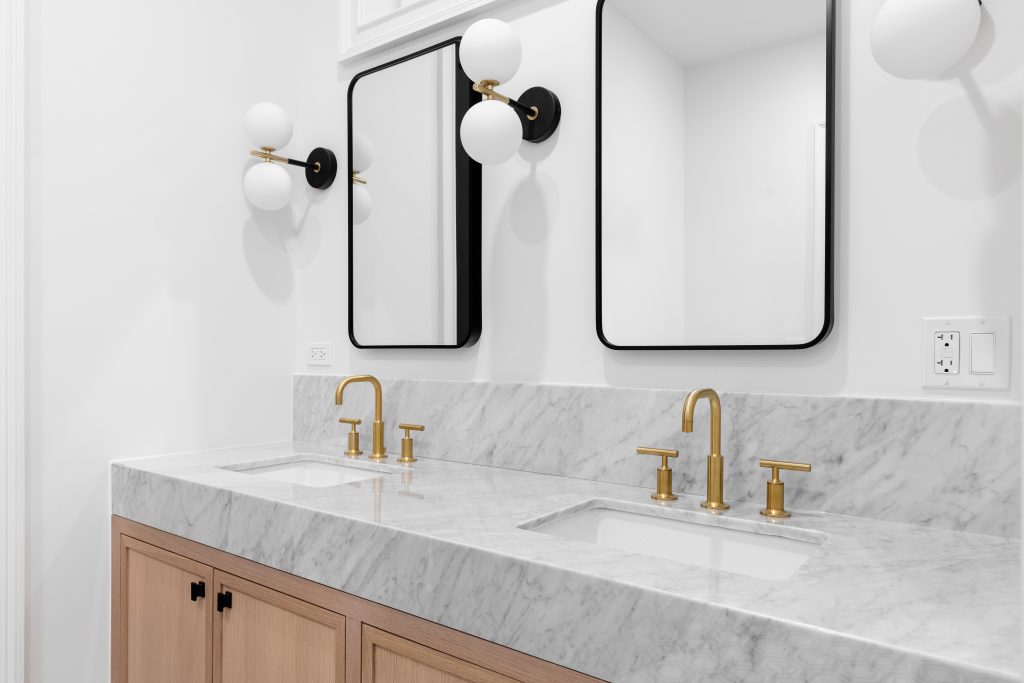What is the best countertop material? A complete comparison guide for residential and commercial projects
- 31 January 2025|
- Blogs|
- Sameer Sawant
Choosing the right countertop material is important. It changes how your space looks and how well it works. Whether you are designing a kitchen at home or selecting materials for a hotel or school, each type of material has its benefits and appropriateness to the surroundings. Some countertop materials are better suited for certain uses than others.
Our full guide will help you look at the different countertop options you can pick from today.

Types of countertops: Understanding your options
When picking a countertop material, consider how you will use it. Commercial kitchens need strong and easy-to-clean materials. Homes, however, often focus more on appearance.
A good countertop material should have several important qualities to suit different uses. Here are some key factors:
Durability: A strong surface can resist scratches, stains, and heat. This is important for busy environments such as Airport checking in desks, Retail food servery counters or Laboratory & Food Tech worktops.
Maintenance: It should be easy to clean and upkeep. Some materials require special products to stay in good condition. A non-porous and seamless surface will not absorb spillages or allow dirt and dust to trap along joint lines, thus making them easy to care and maintain.
Appearance: A nice look is equally important, adding luxury to the overall installation. A good finish can enhance the feel of a kitchen or Hotel Lobby.
Cost: Most high performing and aesthetically appealing worktops require bigger budgets. Where cost is a determining factor (usually in most commercial installations), expectations often have to be adjusted and compromised.
Repairability: Replacing worktops when damaged or excessively stained/scratched is expensive and disruptive. Some worktop materials, due to their make-up, can be restored back to original condition at a relatively low cost.
Contact our experts for advice on the best countertop for your project.
What makes a countertop material suitable for different applications?
The best countertop material for you depends on a few factors, and these points will help you choose the right countertop material for your space:
-
- Level of use
- Maintenance needs
- Environmental conditions
- How to apply
- Budget limits
- Style options

What are some of the most popular types of countertop materials?
There are several types of countertops used in building projects, big or small. Each type has special features that make it different. Let’s explore some of the most popular countertop materials and what makes each one special.
Solid Surface: Versatile, seamless & fully repairable
Solid surfacing material, such as Velstone, is flexible and works well with many designs. It is non-porous, so it stops bacteria from growing, making it ideal for commercial and healthcare surfaces and equally for domestic use. If it gets damaged, one can repair it easily so it is low maintenance. You can also find solid surface countertops in a variety of thicknesses and colours. Solid surfacing material can fit into most stringent budgets and are an excellent step up from laminates or beech tops, but they do not have the extreme robustness of Quartz.
Natural Stone: Traditional elegance
Natural stone, like granite and marble countertops, have a timeless style and unique designs. Granite is very robust and excellent at scratch and heat resistance, making it very durable. Marble, despite its excellent appearance, is porous, needs more maintenance and can scratch easily. Granite is generally expensive, difficult to adapt on-site and colour choices limit usage to domestic environments. Both of these natural stone countertops can be cost prohibitive and, in most cases, unrepairable if damaged.
Engineered Stone such as Quartz: Modern innovation
Engineered worktops are products such as Quartz countertops manufactured by infusing resin into natural stone. They combine natural materials and synthetic binding agents to create a strong and durable material. These surfaces are very robust and heavily resistant to scratches and stains. It needs little maintenance and is available in a variety of colours and patterns. However, they cannot be joined seamlessly and have serious long term health concerns due to Silica. These surfaces are expensive to source, machine and install and do not fit into all budgets.
Concrete: Industrial charm
Concrete countertops are unique and attractive. You can customise their colour and mix in different materials to make them your own. However, they require proper care, which is crucial to prevent cracking and staining. These surfaces also do not appeal to every palette.
Laminate: Budget-friendly
Laminate countertops are made from layers of plastic that are bonded to particleboard to create the countertop surface. A synthetic material, laminate is often associated with cheaper countertops, a budget-friendly option but not very hard-wearing or heat resistant so there may be heat damage. Once damaged these cannot be repaired. Aesthetically they are not appealing and have a more ‘functional’ look about them.
Stainless Steel: Professional grade for commercial kitchens
Stainless steel is a common pick for commercial kitchen countertops. It is easy to clean and can sustain high temperatures for a prolonged period. Stainless tops can dent easily and unrepairable. There is no choice of colours and exclusively used in commercial kitchens and food servery counters.
Wood: Natural warmth
Wood countertops require a lot of care, and they need to be sealed often to prevent water damage. A butcher block is typically made from hardwood and can be popular for kitchens due to being sturdy. Environmentally unfriendly, limited Colours, poor Heat resistance and no repairability option make them generally an unpopular choice.
Comparing popular countertop materials
Knowing what you want from your countertop will help you pick the best one for your project. It’s often a trade-off and balancing what is the most crucial criteria for a project.
Maintenance requirements are important, but so are affordability, aesthetics, and reparability, especially for larger projects.
| Material | Scratch Resistance | Stain Resistance | Heat Resistance | Ease of Installation | Cost of
Repairs |
| Solid Surface (Velstone) | Good | Good | Excellent | Yes | Low |
| Natural Stone (Granite) | Good | Good | Excellent | No | High |
| Marble | Moderate | OK | OK | No | Moderate |
| Quartz | Excellent | Excellent | Excellent | No | High |
| Concrete | Good | Moderate | Excellent | No | Moderate |
| Stainless Steel | Poor | Excellent | Excellent | Yes | Moderate |
| Wood | Poor | Poor | Moderate | Yes | N/A |
| Laminate | Moderate | Good | Poor | Yes | N/A |
Other considerations
When picking a countertop material, price per square foot and style matter a lot. Budget-friendly countertop materials, like laminate, can help save money in the short term but they will require more frequent replacements. A high performing Quartz worktop is desirable but being the most expensive option limits its use on most projects. Solid surface offers a good balance of style, performance and long-lasting value.

Why is solid surface the top choice?
Solid surface is an excellent choice for countertops, whatever project you are working on. A great example is Velstone. It is manufactured using natural minerals, is 100% non-porous solid surface that is known for its fire safety and strength. It combines Alumina Tri-Hydrate minerals with special resins to create a surface that is seamless, durable, and easy to clean for minimal maintenance so it will last a long time.
Solid surface also combines performance with design choices. For example, with Velstone, you have a choice of a variety of styles and different colours, or you can match specific RAL or Dulux shades for aesthetic appeal and a modern look. This way, you can create unique designs that suit your brand. Furthermore, its fully repairable making it a solid long term solution.

Making the final decision
The best countertop material for you will depend on your needs. It will also depend on your budget and how you plan to use it.
As a leader in solid surface manufacturing, Velstone is the perfect choice for several applications, including:
-
- Reception desks and guest bathrooms in hotels
- Science worktops and research labs in schools
- Kitchen & Bathroom tops in Residential and Student accommodation
- Check-in desks and food counters in airports
- Hygienic surfaces in healthcare
- Food Servery & Bar areas and in bars and restaurants
- Stylish and practical countertops for kitchens
- Custom vanity units and cistern panels for beautiful modular bathrooms
- Gallery areas and serving kiosks on cruise ships
For more information on how we can help you with your next project, contact our expert team now and request a free sample.
Frequently asked questions about countertop materials
Looking for quick answers about different countertop options? Here are the most common questions our customers ask about choosing the right surface.
Q: What is better, solid surface or Quartz?
A: Solid surface offers better repairability, seamless installation, and custom colour options. While both are durable, solid surface provides greater design flexibility and long-term value.
Q: Which type of countertop is best?
A: If budget is not a considering factor, Quartz surfaces are the best performing, however they cannot be customised (compared to solid surface) in most cases and very expensive. For long term value, solid surface materials like Velstone offer the best combination of durability, hygiene, repairability, and design versatility for both commercial and residential use.
Q: Which is the least expensive type of countertop?
A: Laminate countertops are typically the most budget-friendly option, though they offer less durability, limited colour choices and low heat resistance compared to other materials like solid surface or engineered stone.
Order a Free Solid Surface Sample
Experience the quality of Velstone solid surface firsthand. Request a free sample and see why it’s the ideal choice for your space.